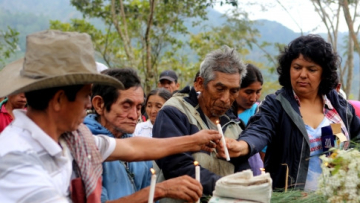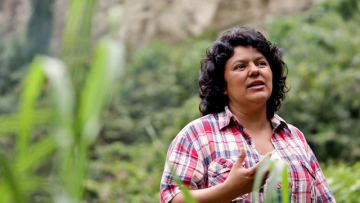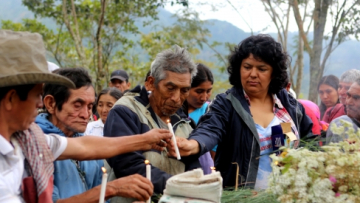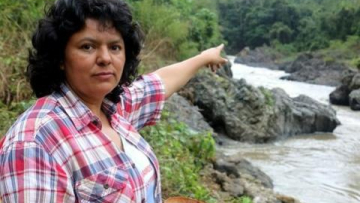Project – On record
This profile is no longer actively maintained, with the information now possibly out of dateBankTrack
Johan Frijns, BankTrack
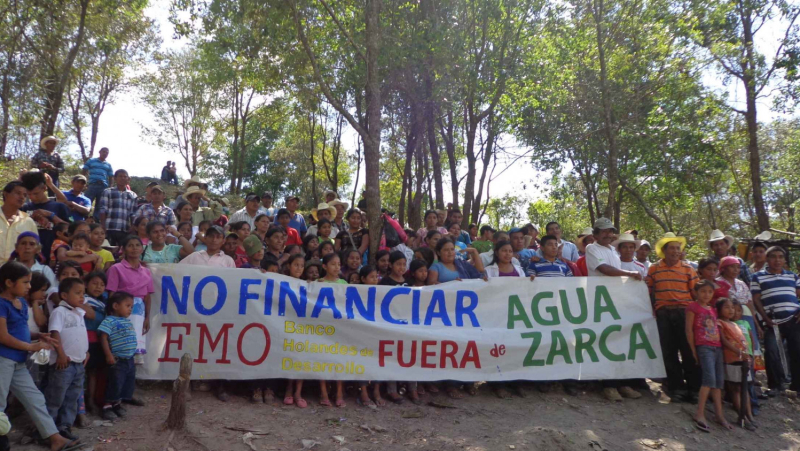
Project – On record
This profile is no longer actively maintained, with the information now possibly out of dateBankTrack
Johan Frijns, BankTrack
What must happen
| Sectors | Hydroelectric Power Generation |
| Location |
|
| Status |
Planning
Design
Agreement
Cancelled
Operation
Closure
Decommission
|
| Website | http://hidroelectricaaguazarca.hn |
|
|
This project has been identified as an Equator Project |
With a generating capacity of 22 megawatts, a 300 metre-long reservoir and a 3 kilometre long diversion channel between the dam and the turbines, Agua Zarca - being constructed by the Honduran corporation DESA - is a relatively small hydroelectric project. But for the local Lenca - indigenous peoples living in Río Blanco, between the departments of Intibucá and Santa Bárbara in western Honduras - it is big enough: the project threatens to dessicate the river Gualcarque and therewith the communal farm lands. The river is an important resource for swimming, washing and fishing, with important cultural and spiritual value.
In 2015, the project was relocated to the opposite side of the Gualcarque river. Therefore, it is no longer to be built on indigenous farm lands, although these may continue to be affected by dessication. In October 2015, construction on the west side started. After the murder of Berta Caceres and other violent incidents in the beginning of 2016, the project's funding was suspended. A fact-finding mission was sent by the lenders, whose findings were published in September 2016. FMO and Finnfund declared to withdraw from the project, and their exit was finalised in July 2017.
Impact on human rights and communities
Many of the indigenous local population fear for their future and the future of their children. Although the relocation of the project prevents further destruction of their farm lands, they fear for desiccation of their lands. Since an unknown amount of water will be channeled, the village of La Tejera, one of the bigger villages in the area, may loose its access to water.
Flowing water has a deep spiritual value for the Lenca population; damming and stopping this water flow means putting a barrier to the life of the river. Spiritual ceremonies are regularly held at the riverbank, which cannot be performed if the river will run dry. There has been an agreement between the mayor and DESA, in which DESA promises a couple of jobs (without detailing the number or the payment), as well as street building and maintenance and partial electrification. The connection of two communities to the main line, but not the electrification of the households. However the community rejects these token gestures and claims that these are responsibilities of the state.
Especially the community of La Tejera, in which protest is widespread, has been socially affected by the project and has to pay a high price for their opposition. Crime and violence has risen since the project began. Infamous hitmen have been reported to be present and several villagers have been attacked and murdered under unclear circumstances. Also, conflict between communities has increased. Inhabitants of other communities are reported to be paid by DESA to guard the construction site with machetes.
The heavy militarization of the region and the constant intimidation, the community reports gun shots at night, arbitrary house inspections and detentions, sexual harassment and death threats, not to mention the killing and injuring of opponents by the military in July 2013, creates a general climate of violence and fear.
The opposition against the Agua Zarca project is seen as the most important struggle of all struggles COPINH is involved in. In their defense of indigenous land against 50 other megaprojects, Agua Zarca is symbolic. 'If they can build this dam, they can build anything they want', a member of COPINH stated.
There have been constant human rights violations connected with the imposition of the Agua Zarca dam, especially the right of indigenous peoples to be consulted (free prior informed consent, FPIC) and to their land and territory, the right to free expression and to assembly, the right to physical integrity, the right to food, the right to water and the right to life, among others. Although the project was relocated, previous construction has damaged farm land, for which villagers not have been compensated. Both DESA and investors point out communal meetings which have been held, but the fact that DESA organised and facilitated these meetings disqualifies them as FPIC, as described in ILO 169.
The state is not only failing to respect human rights and to assure that the company obeys them, but is actively supporting DESA by sending in the military and police force. They are based at the company's facilities, drive in the company's cars, and help out with military equipment and intimidation of the population. This creates the impression that the company has command over the military and police force. Maybe it is no coincidence that the director of DESA, David Castillo, studied in the West Point Military Academy of the US and served as the assistant of the director of the Honduran Army Intelligence. He has also worked as the Technical Director of the Honduran Energy Company ENEE right before joining DESA. Moreover, he was prosecuted for three different corruption charges while he worked for the state.
The project implementation was accompanied by the militarization of the area. Local opponents are subject to arbitrary house inspections and detentions. Several people have been subject to death threats: the COPINH coordinator Berta Cáceres and the other COPINH members Tomás Gomez and Aureliano Molina, also Francisco Javier Sánchez, Lucio Sánchez and others.
On 24th May 2013, Berta Cáceres and Tomás Gomez were arbitrarily arrested in a military checkpoint close to the project, accused of illegally carrying a weapon - which turned out to be a military weapon which was being put in the truck bed ("paila" of the pick-up) at the checkpoint. Since then, Berta Cáceres has been subject to legal restrictions ("medidas cautelares"), even though the case has been temporarily suspended in the court.
On July 15th 2013, military personnel, positioned inside the company's logistics headquarters, opened fire against peaceful local protesters and, with numerous shots from two metres distance, directly targeted and killed the local indigenous leader Tomás García. He, as COPINH members confirm, had earlier been offered money for stopping the protest, which he had refused. His son Allan García was heavily injured and several others injured.
On 2nd March 2016, Berta Cáceres was murdered in her house. Over the years she received numerous death threats. She had insisted on protection by state forces, which the state refused to provide. The murder led to demonstrations in many parts of the world.
Lenca women, who are usually responsible of providing the water for the family and washing the clothes, would probably suffer most from a restricted access to the river which for some represents the only water source. Harrasment of female protesters has been known to take place.
Impact on nature and environment
For the building of the 300 metre-long water reservoir, the diversion channel, the machine house and new streets to the construction site, many trees are being torn down. Several villagers fear the effect this may have on the vulnerable climate. The peasant communities are fully dependent on their corn, bean, vegetable and coffee fields. Besides, by interrupting the flow of the river, fish will be hindered from moving downstream.
Project sponsor
Desarrollos Energéticos S.A. (DESA)
HondurasOther companies
COPRECA
HondurasGerencia Ambiental Internacional (GAI)
GuatemalaMonkey Forest Consulting
Hong KongPöyry Energy Oy
FinlandVoith Hydro
GermanyApplicable norms and standards
The Mother of all Rivers - Honouring Berta Cáceres, murdered for resisting the FMO financed Agua Zarca dam
Testimony of lenca community members intimidated by police
Firmas Falsas Rio Blanco
El Roble parte 2
El Roble parte 1
2022
2022-06-28 00:00:00 | Daughter of murdered Honduran human rights activist files criminal complaint against Dutch Development Bank FMO
Bertha Zúniga Cáceres today filed a criminal complaint with the Public Prosecutor's Office, against the Dutch development bank FMO. The daughter of the Goldman Environmental Prize Winner Berta Cáceres Flores, who was murdered in March 2016, requests the Public Prosecutor to launch a criminal investigation into the complicity of FMO and its executives in violence, corruption, misappropriation of funds and money laundering in the context of the development of the Agua Zarca dam in Honduras (Global Justice Association).
2018
2018-05-18 00:00:00 | COPINH announces court case against FMO
COPINH today announced a court case against FMO, accusing it of negligence that has led to the murder on Berta Cáceres. The response of FMO can be found here.
2017
2017-07-14 00:00:00 | Organisation of American States opened lines of investigation into Agua Zarca
The Organization of American States' (OAS) Mission Against Corruption and Impunity in Honduras (MACCIH) announced on July 14 that it has opened lines of investigation into the Agua Zarca Project and DESA. It announced it is specifically investigating abuse of authority, fraud, and possible money laundering. The Honduran newspaper La Prensa reported on the MACCIH's announcement:
These are several points MACCIH made in their press conference:
- DESA was created May 2009 and by November the company was participating in the energy bidding process for Agua Zarca, and by January it had signed a contract with the SERNA. When DESA was created it had an initial capital of only 25,000 Lempiras and subsequently increased its capital to 381 million Lempiras. The MACCIH spokesperson says this growth is surprising and needs to be verified.
- The Honduran Congress approved the contract for the sale of energy from the Agua Zarca Project on September 9, 2010, before the environmental license was even given.
- The Environmental License was given for 14.458 MW, but then it was amplified to 21.7 MW, which according to the MACCIH was not approved by the Honduran Congress despite the fact the increase required a commitment to purchase additional energy.
- SERNA Vice-Minister Dario Cardona is being prosecuted for authorizing the amplified environmental license with free, prior, and informed consultation of the Lenca people, but according to the MACCIH spokesperson, the then Minister of SERNA Rigoberto Cuellar and the Secretary General Rafael Antonio Canales are the ones who signed the license. The MACCIH spokesperson asks why former Minister Rigoberto Cuellar has not been charged. He is the current Assistant Attorney General (rough translation of Fiscal Adjunto) of the Public Ministry, the institution that prosecutes the cases.
2017-07-12 00:00:00 | Agua Zarca dam construction finally suspended
Construction of the Agua Zarca hydroelectric project on the Gualcarque river has been finally suspended, reports Prensa Latina. This follows the completion of FMO and Finnfund withdrawing their finance for the project. Copinh asks that FMO and Finnfund accept their responsibility for the killings and human rights violations that were triggered by the Agua Zarca project.
2017-07-06 00:00:00 | FMO and Finnfund finalize Exit Agua Zarca
Two of the lenders of the Agua Zarca hydropower project in Honduras, FMO (Netherlands Development Finance Institution), Finnfund (Finnish Fund for Industrial Cooperation), together with owner and developer DESA, mutually agreed to end their existing contractual relations (source FMO).
2016
2016-05-09 00:00:00 | FinnFund announces end to involvement in Agua Zarca
FinnFund has announced its intentions to end its involvement in the Agua Zarca project (source FinnFund).
2016-05-09 00:00:00 | FMO announces end to involvement in Agua Zarca project
FMO has announced its intention to end its involvement in the Agua Zarca project (source FMO).
2016-05-06 00:00:00 | DESA linked to murder Berta
Honduras authorities captured four men for the March murder of activist Berta Cáceres, two of which have direct ties to the hydroelectric company she and others have been battling in western Honduras, and indicated there may have been a larger conspiracy at play. On May 2, Honduran police arrested four people in connection with the murder of Cáceres, an environmental and indigenous rights activist who spent a decade fighting to block construction of dams along the Gualcarque River in La Esperanza, Honduras, about a 100 kilometers from the capital, Tegucigalpa (source Insightcrime.org).
2016-05-04 00:00:00 | DESA comments on arrests related to murder Berta Caceres
Statement from DESA on the arrest related to the murder of Berta Caceres.
2016-05-02 00:00:00 | Arrests made over killings Berta Caceres
On 2nd May 2016, the Honduran police arrested four people as part of the investigiation into the murder of Berta Cáceres. One of them is DESA's manager for social and environmental affairs.
2016-04-20 00:00:00 | European tour of COPINH delegation starts
2016-03-16 00:00:00 | European funders suspend funding for Agua Zarca project
Following the murder of Nelson García FMO and subsequently Finnfund suspend their financing for the Agua Zarca project, The Huffington Post reported.
2016-03-03 00:00:00 | Berta Caceres, leader of COPINH, murdered
Thursday March 3th, Berta Cáceres was assassinated by gunmen, who shot her four times inside her home in La Esperanza, Honduras. Gustavo Castro Soto, a Mexican human rights activist, was also wounded in the attack, and he is now a protected witness.
Berta Cáceres was the coordinator and co-founder (in 1993) of the indigenous organisation Council of Indigenous Peoples of Honduras (COPINH), a human rights defender, and leader of the Lenca Indigenous community. She has been repeatedly threatened with her life for her opposition against the Agua Zarca Dam, complaining of death threats from the police, the army and landowners's groups. Last year, the Inter-American Human Rights Commission had ordered protective measures for Berta Cáceres, but she was not under protection this Thursday. In 2015, Berta Cáceres accepted the Goldman Environmental Prize for her role in fighting the Agua Zarca dam and her work to defend the Gualcarque River. She fought against the dam by filling legal complaints, organising community meetings, and bringing the case to the Inter-American Human Rights Commission.
2016-02-20 00:00:00 | March against the dam in the region of Santa Barbara, fierce repression of police, military and private guards
More than a hundred people were on their way to San Francisco de Ojuera, to march to the construction site from the side on Santa Barbara. Before arriving in San Fransisco, the busses were stopped, people were hauled away from the busses, intimidated and threatened. Arriving in San Fransisco took five hours of walking.
2014
2014-04-06 00:00:00 | Rising violence in Río Blanco
Another attack on April 6th led to two dead and many heavily injured persons in Río Blanco. According to the indigenous organization COPINH, five people who are known as dam supporters - one of them a known hitman in the region - attacked two members of COPINH who were on their way to the field work. In the following struggle, those two and others were heavily injured, two of the attackers died. COPINH decidedly repudiate the media campaign which aims to criminalize COPINH and describe the situation as if COPINH members had attacked two peaceful dam workers. Ever since opposition against the Agua Zarca started, the indigenous protest has been criminalized and repressed. as a result, communities have been divided and violence has increased dramatically.
2014-04-01 00:00:00 | Celebrating one year of resistance
On April 1st, members of the indigenous council of Río Blanco, who are part of the bigger indigenous organization COPINH, celebrate their first anniversary of resistance against Agua Zarca. A year ago, the communities had started a road block to hinder the machines from accessing to the construction site. In the event, they also remembered their comrades who have died and who have goten heavily injured as consequence of their peacful opposition. The occasion was also used to formulate a letter in which they demanded that the dutch bank FMO should quit financing the project.
2014-03-05 00:00:00 | Murder attempt on Dam opponent
On March 5th, María Santos Domínguez, a leader in the local indigenous council of Río Blanco and member of the indigenous organization COPINH, one of the most visible opponents of Agua Zarca, was attacked on her way home by seven men who were armed with machetes. Her husband and 12-year-old son, who came to her rescue, were attacked as well, leaving all three of them heavily injured. One of the attackers, Mr. Fausto Domínguez, died as a result from injuries resulting from the attack. Violence has dramatically risen since the imposition of the hydroelectric dam.
2014-02-07 00:00:00 | FMO confirms support for Agua Zarca
Dutch development bank FMO has confirmed in a letter to BankTrack that it will support the construction of the Agua Zarca dam, this despite the widespread local and international opposition agaisnt this project.
2014-01-08 00:00:00 | IFC CAO confirms CAMIF no longer investing in DESA
The IFC has confirmed it is no longer investing DESA as they conclude it does not comply with their mandate (see their report here).
2013
2013-11-23 00:00:00 | Synohydro confirms termination contract with DESA
Synohydro has confirmed that it has terminated its contract with DESA, citing ongoing dispute with local communities.
2013-09-20 00:00:00 | COPINH leaders convicted
In the court audience the 20th of September, the coordinator of COPINH Berta
Cáceres was convicted with a preventive detention and the other two indigenous
leaders Aureliano Molina and Tomas Membreno were dictaded substitute measures
(not returning to the Río Blanco region where the dam is being built, reporting
every second week to the police station and remaining under custody of the
lawyer). Also, the judge ordered eviction of the road block which the indigenous
people of Río Blanco had been maintaining since the 1st of April. The results of
the court audience are exactly what the company DESA and the Attorney General
had asked for, falsely accusing the three indigenous leaders of usurpation,
co-actions and continuous damage in prejudice of DESA. While this means a hard
stroke for the indigenous movement, COPINH and the local population remain
determined in their struggle against the hidroelectric project. Also, national
and international solidarity is raising.
2013-09-17 00:00:00 | Court case against Copinh leaders pending
There are no results yet of the hearing against the members of COPINH Tomás Gomez, Berta Cáceres, and Aureliano Molina which took place the 12th and 13th of September.The judge will render her verdict after the third hearing, which will be held Friday, September 20th. There are four total charges against the three, not all of which are being heard at this time.The government is requesting that the three be imprisoned. Meanwhile, the police presence in the north of the department of Intibucá, including the village of Rio Blanco, has increased. So have government threats and harassment of those resisting invasion of their lands. Another COPINH member was arrested last week on charges of being a danger to the well-being of the nation.
2013-09-12 00:00:00 | Start of trial against three leaders of COPINH
First day of court cases against three leaders of Copinh, charged with inflicting damage on property of DESA and disturbing public order.
2013-09-05 00:00:00 | Fake agreement between company, government and make believe indigenous representatives
In the beginning of September, in the forefront of the trial against three COPINH-members, DESA signed an agreement with indigenous representatives of Río Blanco, monitored by the Honduran president Porfirio Lobo. COPINH points out that this is just another insidious strategy, since the ones who signed this mutual consent are selfproclaimed leaders which don´t actually represent the local population, which has expressed their categorical rejection of the project numerous times
2013-09-02 00:00:00 | Court audience against COPINH members
On 12th and 13th August 2013, the court audience against the three COPINH leaders Berta Cáceres and the other COPINH members Tomás Gomez and Aureliano Molina took place. They are falsely accused by DESA of usurpation, co-actions and continuous damage in prejudice of DESA, as well as of being the intellectual assassins of a community member. This all is part of a campaign of criminalization of the protest which could lead to the politically motivated imprisonment. Since the hearing in August, the accused must report every week to the court, and are not able to enter the area of the incidents (i.e. the dam protest site). The next and final hearing is scheduled for the 12th and 13th of September. See report here.

